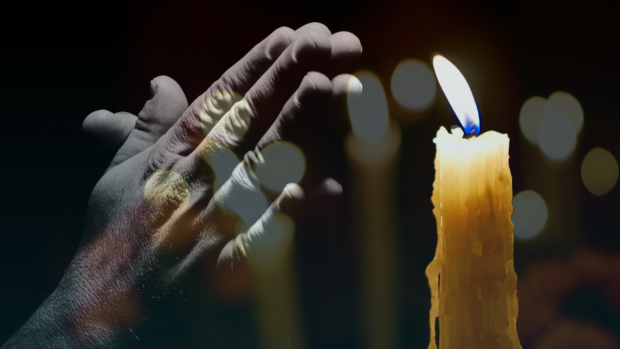MANILA, Philippines—“Let us pray for the departed.”
This was the message of Rev. Fr. Dennis Lauron to people who came to hear Mass on All Saints’ Day, stressing that “all of us, who are still here, should always remember our departed loved ones in our prayers.”
As stated in the 1979 Book of Common Prayer, “we pray for [the dead] because we still hold them in our love, and because we trust that in God’s presence, those who have chosen to serve him will grow in his love, until they see him as he is.”
This was the reason that the Church, every Nov. 2, marks the Commemoration of All the Faithful Departed, or All Souls’ Day, which the Catholic Digest said is a chance to realize that “in life and even in death, we are connected to each one.”
RELATED STORY: LOOK: At least 91,000 people visit Manila North Cemetery for Undas 2022
As explained by EWTN, a Catholic TV network, the Church is composed of the faithful living upon the earth and those who have gone before us: “The latter includes the saints in heaven and the faithful souls being purified in purgatory.”
The Catechism of the Catholic Church defines purgatory as a “purification, so as to achieve the holiness necessary to enter the joy of heaven,” which is experienced by those “who died in God’s grace and friendship, but still imperfectly purified.”
EWTN said this was the reason that on All Souls’ Day, “we honor them for their fidelity in life, as well as pray for them, since they are being purified before entering the All Holy Presence of God.”
Work of mercy
Pope Francis had said: “Church tradition has always urged prayer for the dead, in particular by offering the celebration of the Eucharist for them: It is the best spiritual help that we can give to their souls, particularly to the most abandoned ones.”
RELATED STORY: Undas 2022: What to keep in mind when joining crowds in cemeteries, columbaria
As stressed by the United States Conference of Catholic Bishops, “to pray for the living and the dead” is one of the seven Spiritual Works of Mercy, which “have long been a part of Christian tradition.”
- To instruct the ignorant
- To counsel the doubtful
- To admonish the sinners
- To bear patiently those who wrong us
- To forgive offenses
- To comfort the afflicted
- To pray for the living and the dead
The National Catholic Register explained that “the dead need our prayers as we do not know their final destination […] most likely, they are in purgatory, and our prayers do help them draw closer to heaven.”
“We in turn are asked to pray for our deceased family and friends in a similar way that we are asked to pray for the living. Both the living and the dead (those in purgatory) suffer trials and both are in need of prayers to help alleviate the time and pain endured.”
RELATED STORY: Dying poor: Endless emotional, financial agony for families
Masses, indulgence for the dead
Mass, the Catholic Digest said, “is the absolute best prayer for the dead [as] it makes the redemptive sacrifice of Christ present again on the altar and, in God’s gracious providence, allows you to ask that this redemptive power be applied to the one for whom you pray.”
Because of this, every Nov. 2, priests are given the privilege to say three Requiem Masses: (1) for a specific intention, (2) for the faithful departed, and (3) for the intentions of Pope Francis.
The website Catholic Culture explained that this privilege was granted by Pope Benedict XV in Incruentum altaris and has never been revoked. However, a celebrant may take a stipend for only one of the Masses.
The Church likewise encourages the faithful to hear Mass on Wednesday (Nov. 2) and to receive a “plenary indulgence for a soul in purgatory” by praying the Our Father, Hail Mary and Glory Be for the intentions of the Pope.
This, as an indulgence, which is applicable only to the souls in purgatory, is granted to the faithful, who piously visit a cemetery and pray, even if only mentally, for the departed.
If this is done from Nov. 1 to 8, the indulgence granted is “plenary,” which means “remission of the entire temporal punishment for sin.” The indulgence granted is only “partial” when done before and after Nov. 1 to 8.
“To acquire a plenary indulgence it is necessary also to fulfill the following three conditions: sacramental Confession, Eucharistic communion, and prayer for the intention of the Holy Father,” the Catholic Culture said.
“The three conditions may be fulfilled several days before or after the performance of the visit; it is, however, fitting that communion be received and the prayer for the intention of the Holy Father be said on the same day as the visit.”
